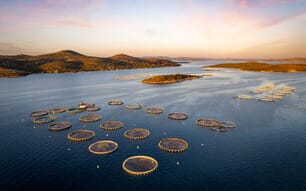The Spanish Government is providing Ghana with a €7-million loan facility to construct and equip six cold stores with refrigeration facilities in some selected fishing communities in the country, according to Peace FM.
This is under the second Ghana-Spanish Protocol Agreement.
It was announced by Kwesi Ahwoi, Minister of Food and Agriculture (MOFA), when inaugurating an 11-member reconstituted Fisheries Commission in Accra.
He said Government had approved and sourcing for funds to construct two fishing harbours and 12 landing sites, estimated at about US$200 million, as part of measures to address the challenges of safety and post-harvest losses in the industry.
Mr Ahwoi said to ensure smooth implementation of the Ministry's crash programme on aquaculture; it had rehabilitated two hatcheries at Ashaiman Aquaculture Demonstration Centre and the Kona Odumase Hatchery, which were at the verge of collapse near January, 2005.
"The idea is not only to provide healthy, fast growing and disease resistant fingerlings, but also to set the standards for the private sector to follow," he added.
Mr Ahwoi said available statistics indicated that the fisheries sector contributed significantly to the socio-economic development of the country.
He said the sector accounted for 4.5 per cent of the National Gross Domestic Product (GDP) and supported the livelihood of about 10 per cent of the county's population.
Fish provides the Ghanaian consumer with about 60 per cent of animal protein needs and is consumed by almost all groups of the society as a daily staple.
However, Mr Ahwoi told Peace FM, Ghana was only able to produce a mere 48 per cent over the past 10 years of its fish requirement.
He said the country's annual fish requirement was estimated at 890,000 metric tonnes while fish available from local production and fish imports was 562,000 metric tonnes.
"It is clear that Ghana is not self sufficient in fish production with an annual deficit of about 328,000 metric tonnes," he said.
Mr Ahwoi called on members of the Commission to enforce the fisheries laws and institute measures for monitoring, controlling and surveillance of Ghana's territorial waters.
He said they should in addition, develop modalities for the management and development of the fishing industry, ensure proper conservation of resources, and collaborate with Metropolitan, Municipal and District Assemblies with fishing communities for the enforcement its bye-laws.
On challenges facing the fishing industry, Mr Ahwoi said they included dwindling fish stocks, poor landing sites, high level of post harvest loses, old and poorly equipped fishing vessels, low investment, inadequate refrigeration and cold store facilities as well as inadequate facilities for aquaculture development.
Others are: lack of statistical data on the number and identification of fishing boats, the number of fishermen for planning purposes, pair trawling, light fishing, use of small mesh sized nets, fishing with dynamites and poaching by foreign vessels within the country’s territorial waters.
Mike Kwabena Akyeampong, former Deputy Minister of Agriculture (Fisheries), and Chairman of the Commission said with the diversity of qualifications, expertise and experiences of the members they would improve operations within the fishing industry.
He said they would ensure optimum utilisation of the resources available in the industry taking full advantage of up-welling seasons and eschew over exploitation and other issues that depleted the country’s water bodies.
"We shall do all these, consistent with good management, good reasoning, balanced judgement and discretion," he told Peace FM.
Other members of the Commission are, Dr Joseph K. Ofori (Water Research Institute), Kwabena Boateng (Ghana Irrigation Authority), Flight Lieutenant Miltiades G. Tackey (president of National Fisheries Association of Ghana), Siisi Essuman-Ocran (Ministry of Transport), Jonathan Addo Allotey (director of Environmental Protection Agency), John Adeabah Mensah (a marine engineer and member of Ghana Marine Fishing Officers Association), Vincent Kwamitse Kaledzi (president of Artisanal Fishermen Council), Commodore Emmanuel Akoto Bonsu (Ministry of Defence), Dr Edward A. Obodai (Fisheries Lecture at University of Cape Coast) and Samuel N. K. Quaatey (acting director of Fisheries Directorate at MOFA).
Spain is Aiding Ghana's Fishing Industry
GLOBAL - The Spanish government is providing a cash boost to Ghana's fishing industry.


